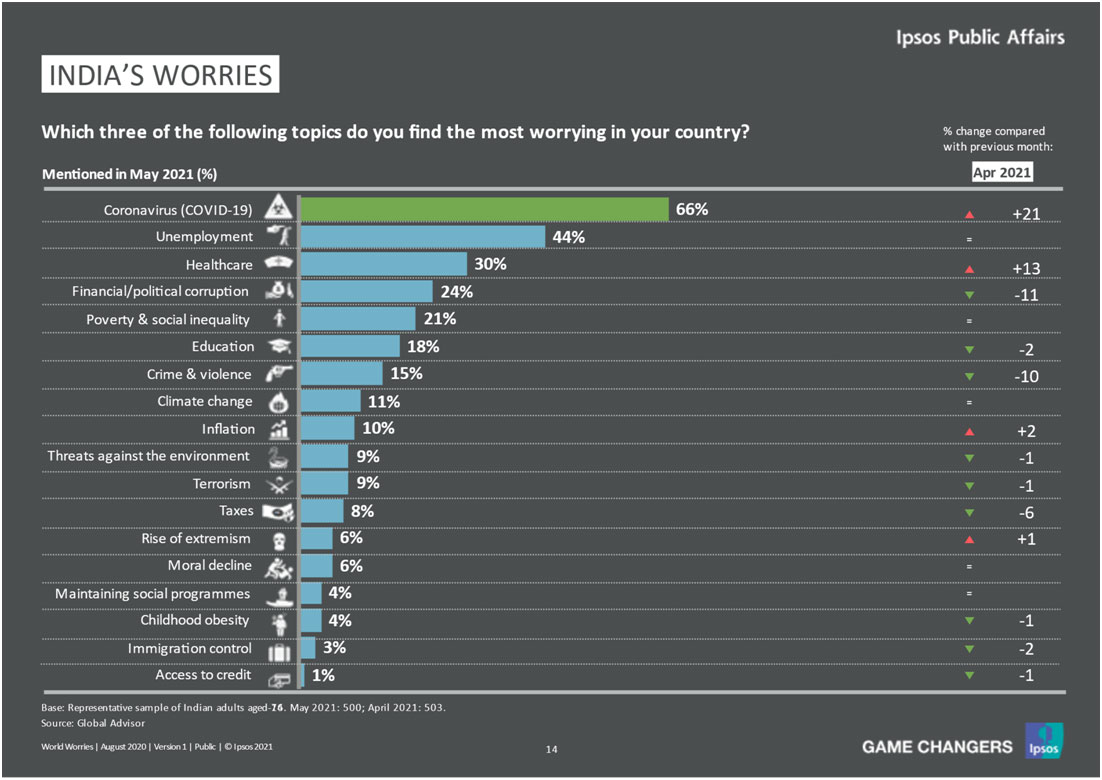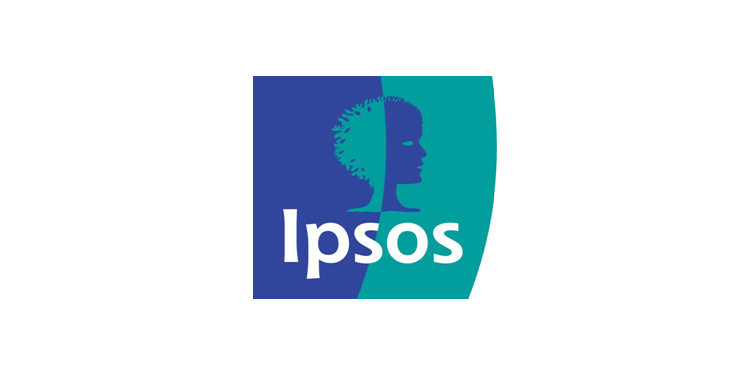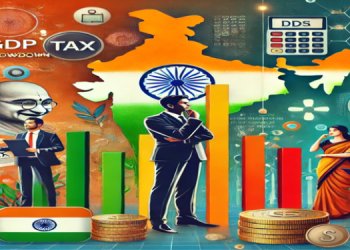New Delhi: According to the May 2021 wave of the Ipsos What Worries the World monthly survey, at least 1 in 2 (48%) urban Indians believe the country is on the wrong track. 52% urban Indians believe the country is moving in the right direction – while we see polarized views, notably from April there has been an 11% drop in optimism – when 63% urban Indians believed the country was moving in the right direction.
Global citizens continue to be gloomy with 65% believing their country is on the wrong track.
The survey shows that Saudi Arabia (88%) and Australia (62%) believe their country is moving in the right direction and are the most optimistic markets.
While Colombia (91%), Peru (83%), and Argentina (81%) believe their country is on the wrong track and these markets are the highest in pessimism.

“We are seeing a major drop in optimism in May over April. The sudden surge in coronavirus infections put our health infrastructure in a tizzy and India was put in a crisis like the situation with a shortage of beds, oxygen, and drugs, leading to high mortality rates. It has shown our helplessness and staved off the confidence of most citizens in our ability to handle crisis. Help from friendly countries and lockdowns have to some extent helped in diffusing the situation but the battle is far from over. It has been a tough period for the country. Health infrastructure up-gradation possibly in anticipation for a third wave and picking up the pace of vaccination are the obvious measures, but the drastic fall in optimism can only be arrested by some confidence-building measures. This degree of pessimism was not observed during the first wave and will only make it difficult for consumer sentiment and demand to improve,” says Amit Adarkar, CEO, Ipsos India.
What worries urban Indians in May 2021
Corona virus is the topmost worry of at least 2 in 3 urban Indians (66%), a 21% increase in worry levels over April. Unemployment stays at no.2 position with 44% of urban Indians worrying about it (no change over April); Healthcare has moved up to emerge as India’s 3rd largest worry with 30% urban Indians worrying about it, showing an increase of 13% over April. Financial/ political corruption was the 4th worry (24%), it has dropped by 11% over April in worry levels and Poverty and Social Inequality (21%) are the 5th biggest worries.
“Two issues that have significantly shot up in worry levels in May are COVID19 and Healthcare; the huge surge and crisis have put India on the backfoot; it has been nightmarish – the surge, our ability to deal with it and in saving lives – it has shaken the confidence of connected Indians, posing a challenge for immediate revival,” added Adarkar.

Global citizens cited their top worries as COVID 19 (42%), Unemployment (34%), Poverty and social inequality (32%), financial/ political corruption (30%), and Crime and Violence (25%).
Technical Note
This 28-country Global Advisor survey was conducted between April 23rd and May 7th 2021, via the Ipsos Online Panel system among 19,070 adults aged 18-74 in Canada, Israel, Malaysia, South Africa, Turkey and the United States, and 16-74 in all 21 other countries.
The “Global Country Average” reflects the average result for all the countries where the survey was conducted. It has not been adjusted to the population size of each country and is not intended to suggest a total result.
The sample consists of approximately 1000+ individuals in each of Australia, Belgium, Brazil, Canada, France, Germany, Great Britain, Italy, Israel, Japan, Mexico, Spain, Sweden, and the US, and approximately 500+ individuals in each of Argentina, Chile, Colombia, Hungary, India, Malaysia, the Netherlands, Peru, Poland, Russia, Saudi Arabia, South Africa, South Korea, and Turkey.
The samples in Argentina, Australia, Belgium, Canada, France, Germany, Great Britain, Hungary, Italy, Japan, the Netherlands, Poland, South Korea, Spain, Sweden, and the US can be taken as representative of these countries’ general adult population under the age of 75.
The samples in Brazil, Chile, Colombia, India, Malaysia, Mexico, Peru, Russia, Saudi Arabia, South Africa, and Turkey are more urban, more educated, and/or more affluent than the general population. The survey results for these markets should be viewed as reflecting the views of the more “connected” segment of these populations.
Weighting has been employed to balance demographics and ensure that the sample’s composition reflects that of the adult population according to the most recent census data.
The precision of Ipsos online polls is calculated using a credibility interval with a poll of 1,000 accurate to +/- 3.5 percentage points and of 500 accurate to +/- 5.0 percentage points. For more information on the Ipsos use of credibility intervals, please visit the Ipsos website.
Where results do not sum to 100 or the ‘difference’ appears to be +/-1 more/less than the actual, this may be due to rounding, multiple responses, or the exclusion of don’t know or not stated responses
The publication of these findings abides by local rules and regulations.

















